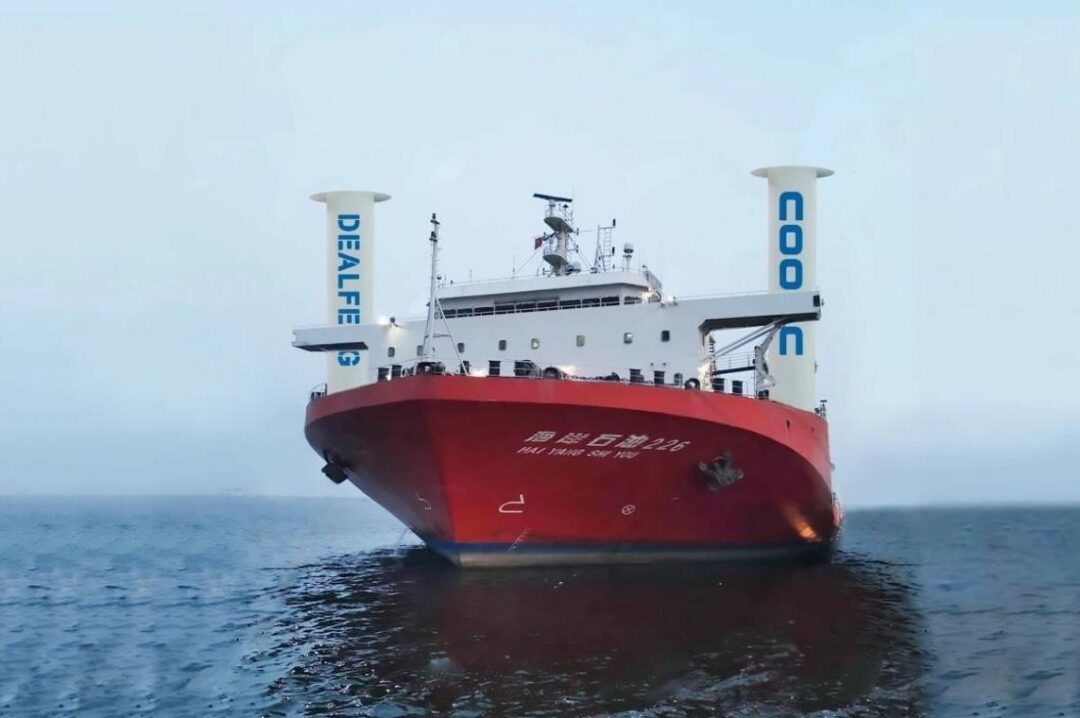
Visit Our Sponsors |
|
|
|
|
|
|
|
|
|
|
|
|
|
|
|
|
|
|
|
|
|
|
|
|
|
|
|
|
|
|
|
|
|
|
|
|
|
|
|
|
|
|
|
|
|
|
|
|
|
|
|
|
|
|
|
|
|
|
|

In one solution to reliance on fossil fuel, these rotor sails generate forward thrust as the wind causes pressure difference around the rotating rotor while a vessel is underway. Photo: Dealfeng New Energy Technology.
The CEOs of leading global shipping lines issued a joint declaration at COP 28 December 1, calling for an end-date for fossil-fuel-only powered oceangoing newbuilds, and urging the International Maritime Organization (IMO), the global regulator, to create the regulatory conditions to accelerate the transition to green fuels.
COP 28 refers to the United Nations Climate Change Conference taking place in Dubai, United Arab Emirates, from November 30 to December 12.
The CMA CGM Group, which owns the third-largest container shipping company in the world, said the only way to meet the IMO’s 2030, 2040, and net-zero 2050 greenhouse gas (GHG) targets is for the industry — which accounts for 2-3% of global GHG emissions — to transition from fossil to green fuels “at scale and at pace.” It was joined by A.P. Moller – Maersk, Hapag-Lloyd, MSC Mediterranean Shipping Company and Wallenius Wilhelmsen.
The CMA CGM announcement said the CEOs are convinced that collaboration with IMO regulators will produce the effective and concrete policy measures needed to underpin the investment within maritime shipping and its ancillary industries that will enable decarbonization to occur at the pace required.
Their joint declaration calls for the establishment of four regulatory ‘cornerstones’:
An end date for new building of fossil-fuel-only vessels, and a clear GHG Intensity Standard timeline to inspire investment confidence, both for new ships and the fuel supply infrastructure needed to accelerate the energy transition.
Read More: Maersk Investing $500M in Southeast Asian Supply Chains
An effective GHG pricing mechanism to make green fuel competitive with black fuel during the transition phase when both are used.
A vessel pooling option for GHG regulatory compliance where the performance of a group of vessels could count instead of only that of individual ships.
A Well-to-Wake, or lifecycle, GHG regulatory basis to align investment decisions with climate interests and mitigate the risk of stranded assets.
“Major players of the shipping industry express their shared conviction that regulation can play a key role in mitigating the cost of the green transition as well as the risk of extreme weather events,” the statement went on. “Given the cost of climate change is far greater than the cost of the green transition, they look forward to being joined by other companies.”
RELATED CONTENT
RELATED VIDEOS
Timely, incisive articles delivered directly to your inbox.







